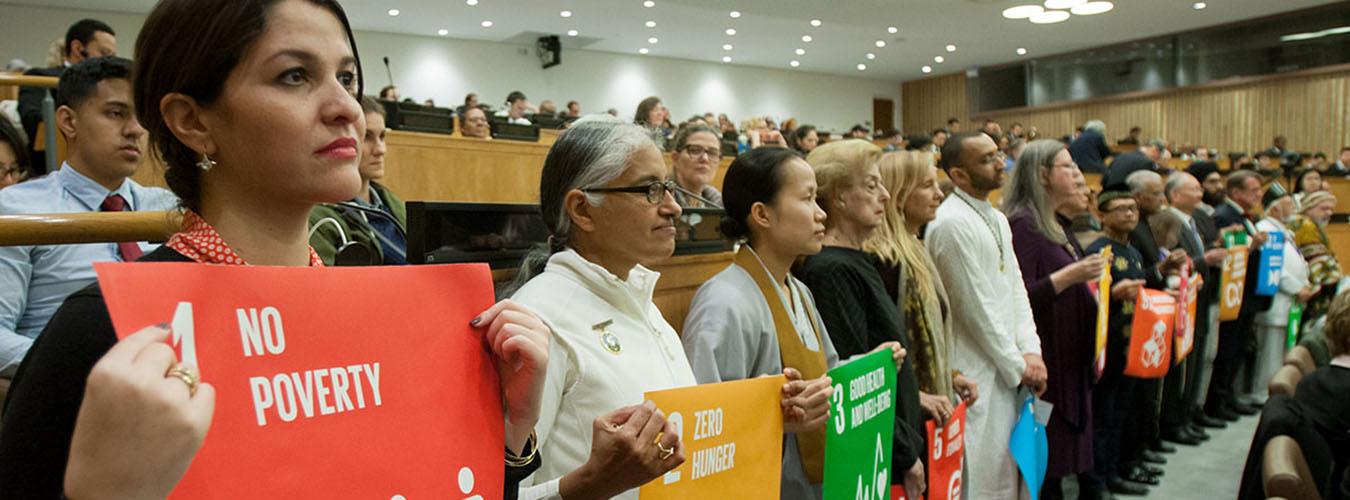Human Rights Related to Freedom of Religion or Belief
Freedom of religion or belief, freedom of opinion and expression, the right to peaceful assembly and the right to freedom of association are interdependent, interrelated and mutually reinforcing. They are enshrined in articles 18, 19 and 20 of the Universal Declaration of Human Rights. Upholding these rights plays an important role in the fight against all forms of intolerance and of discrimination based on religion or belief.
The open, constructive and respectful debate of ideas, as well as interreligious, interfaith and intercultural dialogue, at the local, national, regional and international levels, can play a positive role in combating religious hatred, incitement and violence.
Furthermore, the exercise of the right to freedom of opinion and expression and full respect for the freedom to seek, receive and impart information can play a positive role in strengthening democracy and combating religious intolerance.
Acts of Violence Based on Religion or Belief
There are continuing acts of intolerance and violence based on religion or belief against individuals, including against persons belonging to religious communities and religious minorities around the world, and the number and intensity of such incidents, which are often of a criminal nature and may have international characteristics, are increasing.
That is why the General Assembly adopted the resolution A/RES/73/296, titled “International Day Commemorating the Victims of Acts of Violence Based on Religion or Belief” strongly condemning continuing violence and acts of terrorism targeting individuals, including persons belonging to religious minorities, on the basis of or in the name of religion or belief.
The Member States reaffirmed their unequivocal condemnation of all acts, methods and practices of terrorism and violent extremism conducive to terrorism, in all its forms and manifestations, wherever and by whomsoever committed, regardless of their motivation, and reiterated that terrorism and violent extremism as and when conducive to terrorism, in all its forms and manifestations, cannot and should not be associated with any religion, nationality, civilization or ethnic group.
The General Assembly decided to designate 22 August as the International Day Commemorating the Victims of Acts of Violence Based on Religion or Belief.
The Day comes right after the International Day of Remembrance and Tribute to the Victims of Terrorism, 21 August.
Background
The General Assembly, in its resolution A/RES/73/296, designated 22 August as the International Day Commemorating the Victims of Acts of Violence Based on Religion or Belief recognizing the importance of providing victims of acts of violence based on religion or belief and members of their families with appropriate support and assistance in accordance with applicable law.
It strongly deplored all acts of violence against persons on the basis of their religion or belief, as well as any such acts directed against their homes, businesses, properties, schools, cultural centres or places of worship, as well as all attacks on and in religious places, sites and shrines that are in violation of international law.
A previous resolution establishing the International Day of Remembrance of and Tribute to the Victims of Terrorism (A/RES/72/165) also recognized that working together to enhance the implementation of existing legal regimes that protect individuals against discrimination and hate crimes, increasing interreligious, interfaith and intercultural efforts and expanding human rights education are important first steps in combating incidents of intolerance, discrimination and violence against individuals on the basis of religion or belief.
By proclaiming an International Day Commemorating the Victims of Acts of Violence Based on Religion or Belief, the General Assembly recalled that States have the primary responsibility to promote and protect human rights, including the human rights of persons belonging to religious minorities, including their right to exercise their religion or belief freely.
Resources
Documents
- General Assembly Resolution (A/73/L.85)
- Charter of the United Nations
- United Nations Counter-Terrorism Strategy
- Declaration on Measures to Eliminate International Terrorism
- Documents related to Victims of Terrorism
Websites
- United Nations Office of Counter-Terrorism
- High-level Conference on Counter-Terrorism
- Victims of Terrorism Support Portal
- Directory of Organisations Supporting Victims of Terrorism
- Remember the Fallen
- Alliance of Civilizations
- High-level Dialogue on Interreligious and Intercultural Understanding and Cooperation for Peace
Office of the High Commissioner for Human Rights (OHCHR):
- Special Rapporteur on promotion and protection of human rights while countering terrorism
- Special Rapporteur on freedom of religion or belief
- Special Rapporteur on the promotion and protection of the right to freedom of opinion and expression




